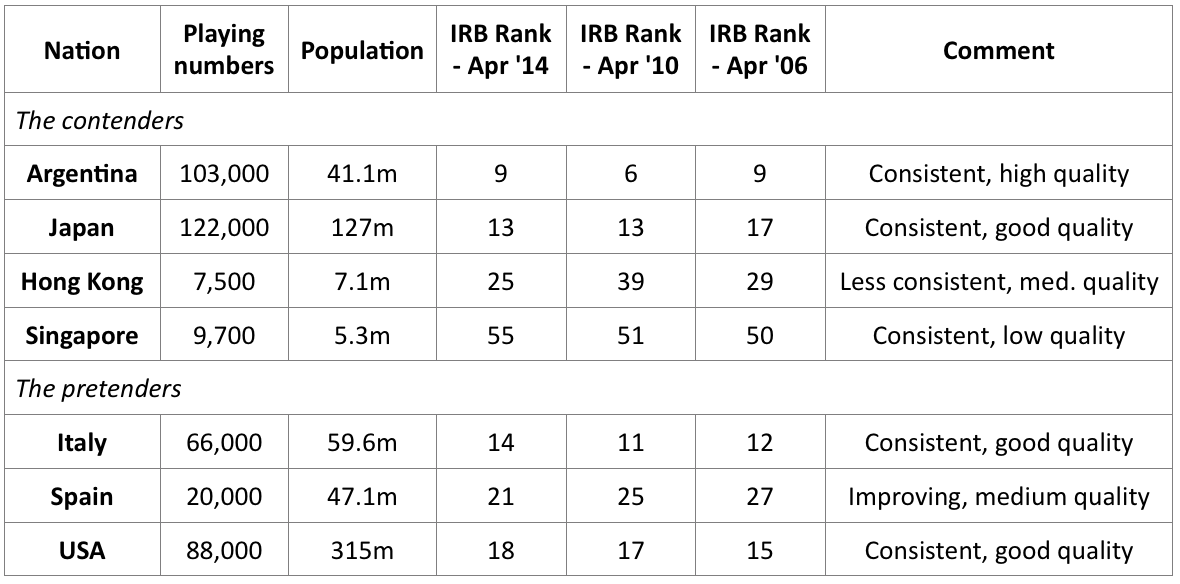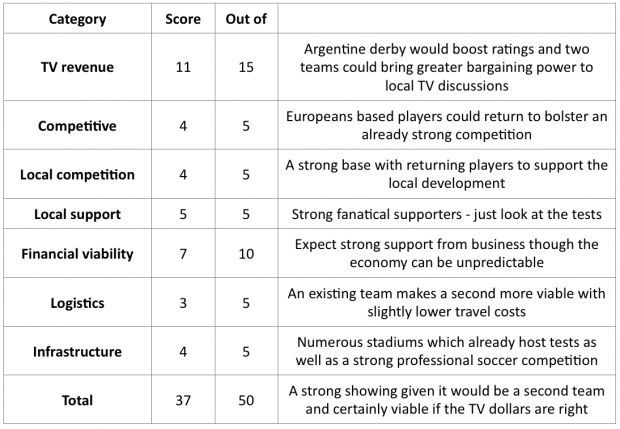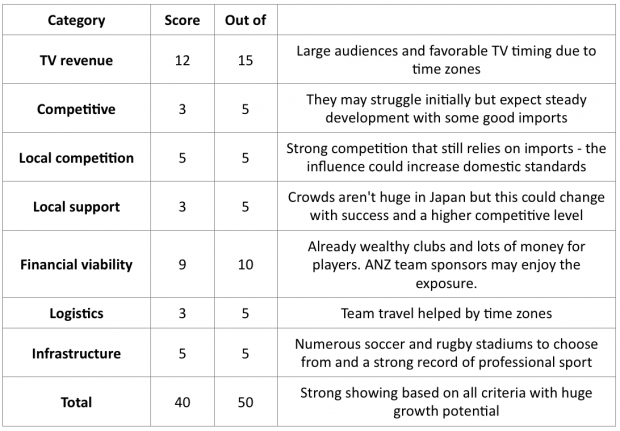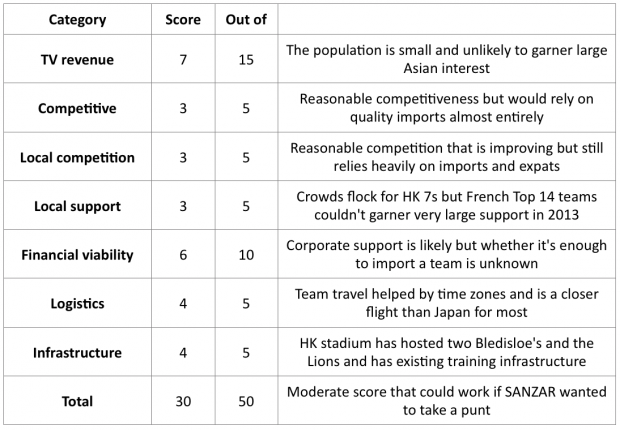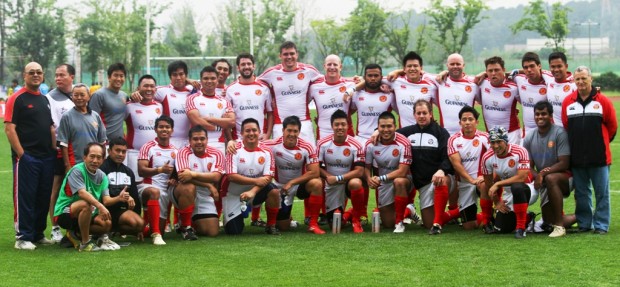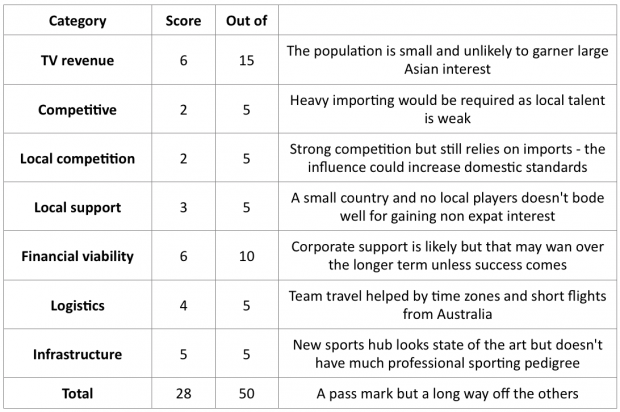Just this week SANZAR announced that Super Rugby will evolve to an 18 team model, with additional South African and Argentinian teams. The question then remains – who should be the 18th Super Rugby team?
Rumours have come from wide and far and countries as far flung as Spain, Italy and the USA have been touted as possible additions, yet while they may have some credible arguments, it seems the ARU are strongly in favour of Asian expansion, and most likely into Japan.
Expansion – a quick market sizing
According to the commercial media, it sounds like there are number of serious contenders in Japan, Singapore and Hong Kong as well as mention of Spain, Italy, and even the USA. When you look at the numbers and the strength of Argentina, we’ve decided to include the possibility of two teams from Argentina – partly for arguments sake and partly because it seems fairly logical when you look at their numbers and the logistics of having two teams in one country.
Firstly, playing numbers help understand exactly how big the game is in the countries being mentioned. Unsurprisingly, Argentina (103,000), Japan (122,000) and Italy (66,000) are quite large, but what surprised was how large the US (88,000) playing stocks are, and on the other end of the spectrum, how small nations such as Spain (20,000), Hong Kong (7,500 ) and Singapore (9,700) are despite being mentioned as potential contenders. The population is a crude estimate of how large the market for television viewers could be.
As we know, quantity does not mean quality – the Pacific Island nations of Fiji, Samoa and Tonga area clear example of this fact – so we’ve used the national IRB rankings of contenders over time to highlight both the quality and the consistency of the playing standard – and there are some interesting trends. Hong Kong and Spain both seem to punch above their weight, with good rankings and small playing stocks. Japan, Italy and Argentina are obvious quality and consistently in the top 15 with the USA not too far behind.
The criteria
We’ve come up with seven possible criteria and given each ‘contender’ a score according to how they could perform, ending up with a score out of 50:
1. TV revenues and exposure

In reality this is probably the only thing that really matters, since building the revenues of the game through television rights is the best way to incentivise expansion for the existing governing bodies as well as help expand the game over the longer term.
Think Cuba Gooding Junior in the movie Jerry Maguire – “Show me the money!”. From an Australian perspective, ARU CEO, Bill Pulver has made no secrets about his desire to see a large increase in revenues from the upcoming television deal. Currently the ARU receives $25m per year in funding from Foxtel, significantly lower than its nearest competitor, the A-league, who receive $40m per year.
TV revenues are the largest source of non test related revenues for the governing bodies of each union, as well as an important way to get the Super Rugby product exposed to new markets meaning this is an key driver for decision making and any future growth strategy. Score out of 15
2. Their ability to be competitive
While this should be important, we’ve seen the Force, Rebels, Kings and Lions all struggle for the most part, so it may not be that significant after all. The last team to be a success in Super rugby following inclusion must surely have been the Brumbies in the late 1990s when the professional era had just arrived. Probably the key point question is whether they can be relatively competitive over the longer term and be able to attract or develop quality players over time to mitigate the risk that a team is a two year wonder. Score out of 5
3. Strength of the domestic competition
While somewhat important, it does not seem to be of huge historic significance. The Rebels and the Force are backed by mediocre competitions that produce only a smattering of local talent and the Brumbies under Jake White have only recently refocused on their local competition, so perhaps its a ‘nice to have’, rather than a necessity. It probably becomes more important depending on the financial resources available to import players in the short term. Score out of 5
4. Local support and crowds

Given that gate takings, signage, favorable stadium contracts and merchandise sales form a large part of a Super rugby sides revenue, you would assume local support matters. However, when you look at some numbers it becomes less relevant. In 2013, the Rebels averaged 11,442 and the Force 12,631 which was second and third last respectively among Super rugby average crowds. On the other hand, the Kings were ranked third with an average of 31,783, so you can see the case for their inclusion, and most surprisingly last year’s champions, the Chiefs could only manage an average of 14,081 despite home finals – so perhaps crowd’s don’t matter anyway? Score out of 5
5. Financial viability
All teams would likely have to guarantee some sort of financial backing to be considered. This might come from a wealthy individual (such as Harold Mitchell for the Rebels), a consortium, or even government funding. Private backing has been the model for the recent NRC and has taken on various forms, but given the larger scale of Super Rugby, a strong business case would likely need to state the case for sponsorship and corporate support to cover the high costs of travel, players and administration.
There is also a the second point – what can this team’s inclusion bring to other teams and the wider competition to make it more attractive? This might be through sponsorship exposure, gate sharing arrangements (common practice in the AFL) and adding to the quality and prestige of the competition. Score out of 10
6. Logistics
Is a consideration in terms of TV scheduling and player travel competition as the competition looks to become more global. Already, schedulers need to take into account multiple time zones across three countries, and this would be made even more difficult by the inclusion of Argentina. The move to the current conference system was in part aimed to reduce the burden of large travel costs, so the less costly travel is, the more appealing a proposition might be. Score out of 5
7. Infrastructure and professional setup
An existing stadium or which could be built before the 2016 season is a good start. In addition, evidence of training and other professional sporting facilities or teams might provide further evidence as would existing professional coaching and a proven ability to host large Rugby matches. Score out of 5
The weighting is heavily in favour of financial criteria so the new team would likely bring growth potential through television revenues and have strong financial support.
So with these in mind, let’s take a look at the contenders in more detail and score them:
Argentina
As the numbers suggest, it seems like a no brainer for one team; a constant top ten team with a large rugby playing base and large population to support the game. What is amazing about Argentina is that they’ve managed to maintain such a high ranking without more exposure to top flight domestic rugby. A single team means that the competition is heading to the America’s. But just one team? It might be politically difficult to make it work, but it looks like there could be a case for a second team.
A second team could be a beach-head for another conference and possibly huge television revenues that could come from North and South America over time. If they’re good enough for one and you could convince European based players to head home then they could surely support two teams. The local derbies would be spirited and would provide the competition with passion and a new style of play.
Japan
What is also interesting about Japan is the relative lack of professional sport in the country. Baseball and Soccer are huge with Rugby in third so it’s hardly the congested Australian landscape. While the former are unlikely to be overcome, there is a huge population of 127m and the potential for growth is large, particularly when considering the boost that the RWC will bring and how quickly soccer grew there during the 90s.
It already has a clearly established competition, successful national team, wealthy domestic league and will host a RWC. The domestic league is already producing players for Super Rugby, they’re national team has played in every world cup and continues to improve (recently beating an under strength Wales) so the question is, do they need Super rugby to be successful?
Eddie Jones thinks this is the natural next step and has come out in support of their inclusion, speaking to size of Japan’s economy (the world’s third largest) and playing population (around 122,000), rugby infrastructure and local playing talent. He has some good points – a big potential audience, established competition, corporate money, similar time zones. Australia seems to be behind Japan allowing the inclusion of one Japanese player per team outside of the salary cap, so perhaps this is a sign of the way the ARU is leaning.
A super team from Japan would be more likely to succeed over time and would bring much needed TV revenues to SANZAR nations. Does the Japanese Rugby Union want it when it could turn the existing competition into the equivalent of a third tier? This is a matter of perspective, but Super rugby would likely provide their best players with weekly exposure that will improve their domestic standards. This can be taken back to domestic competitions and will also help the international team to improve, and once they are regularly competing with the top nations, it could be a huge success story over time.
Hong Kong
HK has a wealthy governing body supported largely by the annual rugby pilgrimage otherwise known as the HK 7’s. It has a six team semi professional competition despite a smaller player base than the other nations, and could potentially tap into strong corporate support and the existing stadium and infrastructure.
In fact, there is an professional flavour emerging in Hong Kong. HKRFU have recently appointed former Force CEO, Vern Reid as President and have improved their player/coaching stocks through former European based players Joe Shaw (Newcastle Falcons) and Andy Hall (Scotland/Newport-Gwent Dragons) and Deacon Manu (Fiji/Waikato/Lianelli) so it seems they’re making a concerted effort.
The HK national team are ranked 25th (well ahead of Singapore’s 55th ranking and Asian division two status), perform well regularly in the Asian 5 nations, and are coached by ex Newport-Gwent assistant coach, Dai Rees.
Reid also has experience in super rugby with the Western Force and should be all too familiar with the challenges of a rugby ‘start up’. Reid has identified several focus areas, including the “need to develop more facilities to accommodate the rapid growth in rugby, raising domestic standards and creating initiatives for 15s rugby”, so he’s certainly making the right noises to support the ‘semi pro’ approach.
HKRFU is a wealthy union consistently posting operating surplus’s that are funded largely by its successful HK 7’s. Based on 2011/12 financials, the union had AU$20m in the bank – a bit better than the ARU if you recall – so it seems that the HKRFU is well established with deep pockets. There are also strong corporate links through the expat community and the national teams sponsor, HSBC has pre-existing links (think British Lions and Tahs), so there does seem to be a reasonable argument.
Singapore
It is making the right noises with some media sources suggesting they’re the Asian frontrunner. A new ‘sports hubs’ due for completion in 2014 and state led support suggests it could be possible but surely it’d be too risky a move to make. It is a small nation of only 5m, a small rugby playing population, a poorly ranked team (55) to couple the stifling humidity and yearlong heat that makes the logistics of playing there difficult.
Singapore’s rugby administration seems less organised and developed than Hong Kong’s, with less of a professional feel than Hong Kong and Japan and it hasn’t hosted large Rugby events. The best case study for a similar expansion seems to be the NBL’s Singapore Slingers which lasted two seasons before withdrawing due to high travel costs, so expansion to the area might require deep pockets and strong government support as well as the ability to build local support beyond the expats. Producing local talent within a few years might get the local crowds interested – there are not enough expats to get large crowds – but that could be difficult given the low domestic standards. In Hong Kong perhaps this is less so, with their pin-up, Rowan Varty having played for a Barbarians team against England at Twickenham last year and a number of other home grown players regularly playing in Japan.
Hong Kong and Singapore – some interesting advantages and disadvantages
There are challenges for both Singapore and HK. The humidity from April onwards (Super Rugby season) is up to 95% and typhoons are an issue, so night games would be the probable option. That means, the television audience is similar to a Perth game and somewhat restricted. Local audiences might come from expat Kiwi’s, Aussie’s, French and Brits but that probably wouldn’t be enough to get large crowds so getting the local buy-in would be important, although not assured. The ability to host rugby events probably strengthens Hong Kong’s case with recent matches including the Lions v Barbarians match, multiple Bledisloe Cup and a match between Racing Metro vs. Toulouse in recent years.
What is really interesting about Singapore and Hong Kong is their tax status. Both are tax havens where the effective tax rates is closer to 15% compared to the lofty 37-45% for most top players in Australia. This huge disparity could be the lure for high profile players to earn big dollars, providing there is strong financial support to pay top playing talent. Alternatively, this tax difference could offset any higher travel costs associated with either teams.
Also, when looking at either of these tax friendly nations, is the idea of a regional team. Expat communities throughout SE Asia have large overlaps, particularly between Singapore and HK, so perhaps a franchise could appeal to a wider geography with games in both cities that build a regional brand? In theory, it could be a team of Europeans, SANZAR and Asian players earning a handsome wage, competing in Super Rugby and potentially even still playing internationals for their home nations. A unique prospect and quite representative of the expats.
The pretenders
Italy and Spain are surely posturing, potentially trying to get the attention of their European neighbours. It seems unlikely that we would see a European team joining Super Rugby ahead of the others unless their case becomes stronger and they are locked out of European competitions. Remember it took a RWC third placed finish for the rugby world to take notice of Argentina.
USA on the other hand is the sleeping giant of rugby. It is probably a bridge too far for 2016 expansion as they continue to work on their own plans for a professional domestic competition, but if Super Rugby can tap into its sporting talent, large audiences (a small slice would be enough) and large corporate dollars, it could be a huge boost to the global game. If the US is part of a longer term strategy, then it surely supports the option of building up Argentina for a potential American conference.
And the winner is….
The scoring clearly has Japan (40/50) as the favoured option and rightfully so, but there is a case for a second Argentinean team (37/50), particularly if it is part of a longer term American strategy. Hong Kong is still a possibility and despite being a less safe option than Japan, it could be compelling if something unique appeared and there was strong financial support. Singapore is surely a lost cause unless there is strong, long term backing, probably from the Singaporean government.
In terms of financial prospects, Asia is probably more attractive for corporate sponsors aiming to gain exposure to large Asian export markets and build relationships. In that sense, all clubs could benefit from increasing exposure and sponsorship dollars, which may be persuasive. The ARU seems to be leaning towards Japan and it seems a rational bet in terms of dollars, existing players, infrastructure and a longer term Asian strategy. My money will be on Japanese team coached by Eddie Jones.


